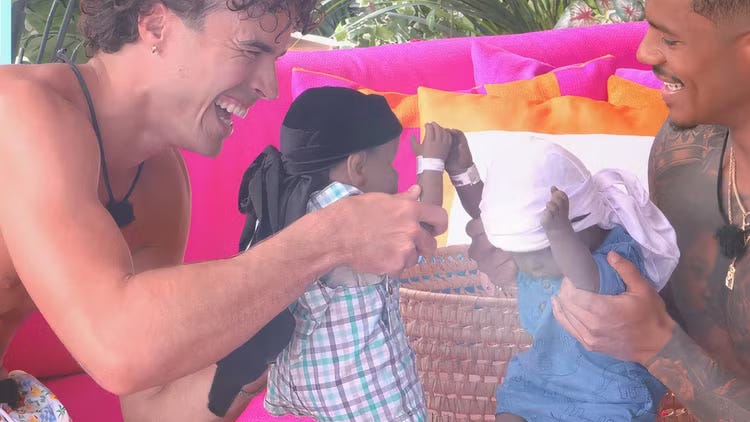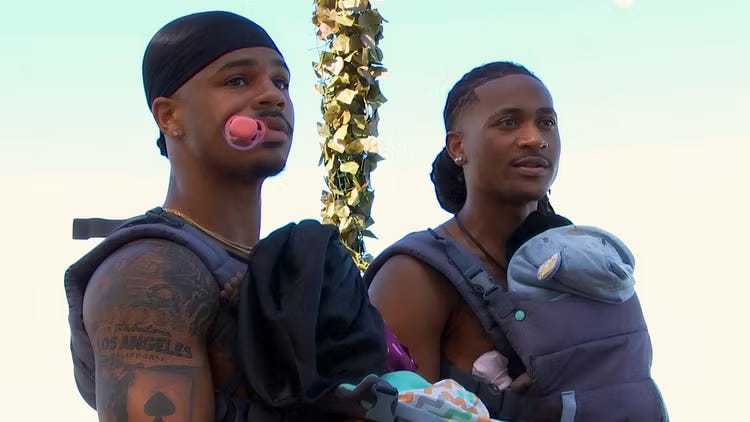We Need To Talk About The 'Love Island' Baby Challenge
SPOILERS AHEAD for Season 7, Episode 32 of Love Island USA
A new bombshell has entered the villa. Six bombshells, actually, in the form of robotic baby dolls — designed to test the if the islanders’ relationships can withstand parenthood.
Parenthood, in the eyes of the villa, consists of only a few things: couples mutually agreeing on baby names, occasional feeding and burping, and… well… that’s basically it.
This challenge has long been a staple of ‘Love Island UK’, but something about the challenge making its first appearance in the ‘USA’ franchise rubbed me the wrong way. Perhaps it was Nic casually mentioning that he’d considered adopting as a single parent — using ChatGPT as his primary tool of research — because he wanted a little “travel buddy.” (Or even that Olandria found the conversation endearing.) Perhaps it was watching a group of grown men scheming to race their dolls around the villa the second the women left them to their own devices. On the flip side, perhaps it was when things got too serious: like when Huda (the resident Mamacita) had an outburst over her partner leaving their plastic baby’s neck unsupported. At the end of the challenge, four couples “passed” the test and two couples “failed.” But based on what? How were they scored? We never found out.
The flimsy experiment in parenthood led the islanders to chat about how the challenge brought them “closer.” Amaya, for example, claimed it proved Brian would be a great dad. Later on, the contestants took turns talking about how many kids they each wanted — with the general consensus being between two and six. Seemingly nobody was childfree by choice.
Which is surprising, right? And not only because this is a group of horny twenty-somethings with underdeveloped brains who spent the last month swapping partners and trading coldsores.
Rather, a 2024 Pew Research study found that 47% of Americans under 50 without children said they’re unlikely to ever have kids. Another survey found that about a quarter of Gen Z and millennials claim they won’t have kids due to finances. And yet, on an island property full of 11 aspiring influencers (plus Amaya), not a single person is consciously opting-out of parenthood?
Maybe I’m at fault for being even remotely surprised. After all, it’s a reality show.
It’s a reality show that upholds traditional beauty standards in only casting thin, conventionally attractive contestants. (And, as many have pointed out, pairs less attractive, less accomplished men with more attractive, more accomplished women.)
It’s a reality TV show that’s already had to kick off two contestants in one season after their past use of racial slurs resurfaced online. The producers simply could not be bothered to do background checks, asking instead for contestants to police their own social media for "anything racist, sexist or homophobic."
It’s a reality show produced by, according to one TikToker, predominantly bald, white men.
All things considered, why wouldn’t it *also* uphold traditional gender roles and traditional family planning?
One user on TikTok told me I don’t know how to “have fun” after I criticized the baby challenge in a brief video. And sure, that’s fair. I’m willing to admit that the baby challenge is kind of fun at face value. But at what cost?
When you look at the challenge more carefully, it starts to look less innocent and bit more like nefarious pronatalist propoganda. After all, it serves to uphold the power structures of those people behind the camera. Balding white men — or rather the patriarchy — directly benefit from perpetuating (in big ways and small ways) the idea that becoming parents is the norm. (In big ways like Project 2025 and in small ways like media representation on a show you’re asked to consume 5 days a week.) How else would a mediocre man who can barely cook a pancake snag a baddie long-term, if not trapping them with a baby?
Think about it. This reality show, which is watched predominantly by young women, portrays meaningful conversation about parenthood as easy and casual, light and airy. The discussion never wades into the “unsexy” topics that couples should consider when choosing a partner: like how they’ll split the division of domestic labor, if contestants risk passing on a genetic dispositions for mental illness, or how they’d broach struggles like infertility or raising a child with chronic disease. Put another way: is making parenthood look easy — as easy as strolling a villa in Fiji in a BabyBjörn or attending yoga session to cradle a plastic baby gently between downward dog poses in a bikini — good for society? Or more specifically: good for women?
Currently, the show frames parenthood as inevitable and babies as a cute accessory to a dream relationship. And while I’m not opposed to the topic of parenting being discussed on the show, I think we’d be better served if the framing was more realistic. What if, instead of the baby challenge, the islanders got to smooch a person of their choosing for accurately guessing the average cost of daycare (which often exceeds the cost of rent)? Or perhaps they could rank themselves in order of whose city of residence was more or less likely to suffer from climate change water wars — only to find out that the person living in the most dangerous climate environment would be vulnerable of elimination from the villa. Maybe even — DING! — someone could get a text: they need to meet at the fire pit immediately to stage a mock PTA meeting.
Or perhaps I’d settle for just one person — ONE PERSON — getting to express why they’re choosing to not have children.
I’m not asking Love Island to take all the fun out of the show. But it should consider being more thoughtful (first in their casting, next in their planning) in helping shape how this generation talks about things like starting a family. If even one person had the space to say “parenthood’s not for me,” that wouldn’t just be great TV. It might be enough to shift the cultural narrative. Until then, we’ll keep pretending that wanting a bunch of mini-me’s is the only socially acceptable path. Which in 2025, let’s be honest, is more delulu than anything else happening in that villa.





